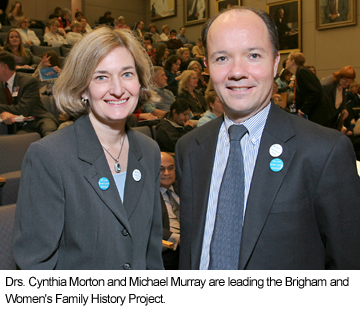BWH Kicks off Family History Project

Twenty minutes to complete your medical family tree could save your life and empower you and your family to get the best health care possible. That's the root of the Brigham and Women's Family History Project, a year-long initiative launched in November. The U.S. Surgeon General tapped BWH to be the first employer in the U.S. to encourage employees to voluntarily complete the “My Family Health Portrait” tool.
On an individual level, this tool could ensure participants receive the most appropriate health care from their primary care physician. On a national and worldwide level, BWH's participation in this project will strengthen the role of preventive and predictive genetics in health care.
“We could show the world that collecting our family medical histories is valuable and that it could someday save our lives,” said Cynthia Morton, PhD, director of Cytogenetics, under whose leadership the demonstration project was initiated.
While BWHers help themselves and their families throughout this project, they can also help shape and refine the project for the rest of the country.
“We’re delighted to have such a remarkable institution be the first out of the gate,” said Francis Collins, MD, PhD, director of the National Human Genome Research Institute, who visited BWH on Nov. 15 to launch the tool nationally. “Fam-ily history is one of the most powerful ways to personalize medical care. It is the bedrock of the way we predict disease and the way we keep people well.”
Rick Mitchell, MD, PhD, a cardiovascular pathologist, truly grasps the magnitude of this project and shared his story at the Nov. 15 public launching. After being diagnosed last year with
colon cancer, Mitchell discovered that his children are likely at greater risk for the disease. However, sharing this information with his children will help them to prevent the disease, he said. “Hopefully, knowing my history will help them avoid the cancer surgery I faced last February.”
Michael Murray, MD, clinical chief in the Division of Genetics and Family History Project leader, plans to survey participants about how easy the tool was to complete and what could make it more user-friendly. Murray's survey and research focuses on the use of the tool, not individuals' family medical histories. All personal information remains confidential. Participants can store their information only by saving it to their own desktop, file or disk. Those who complete the form at work should save it on a disk rather than the desktop, or download the printable version, which is available on the Intranet, and fill it out by hand.
BWH President Gary Gottlieb said, “As a hospital and as health care professionals, we know genetics is at the precipice of changing the way we provide care. As an employer, we have the unique opportunity to make sure our employees are poised to take advantage of that change.”
Visit http://familyhistory.hhs.gov to access the tool.